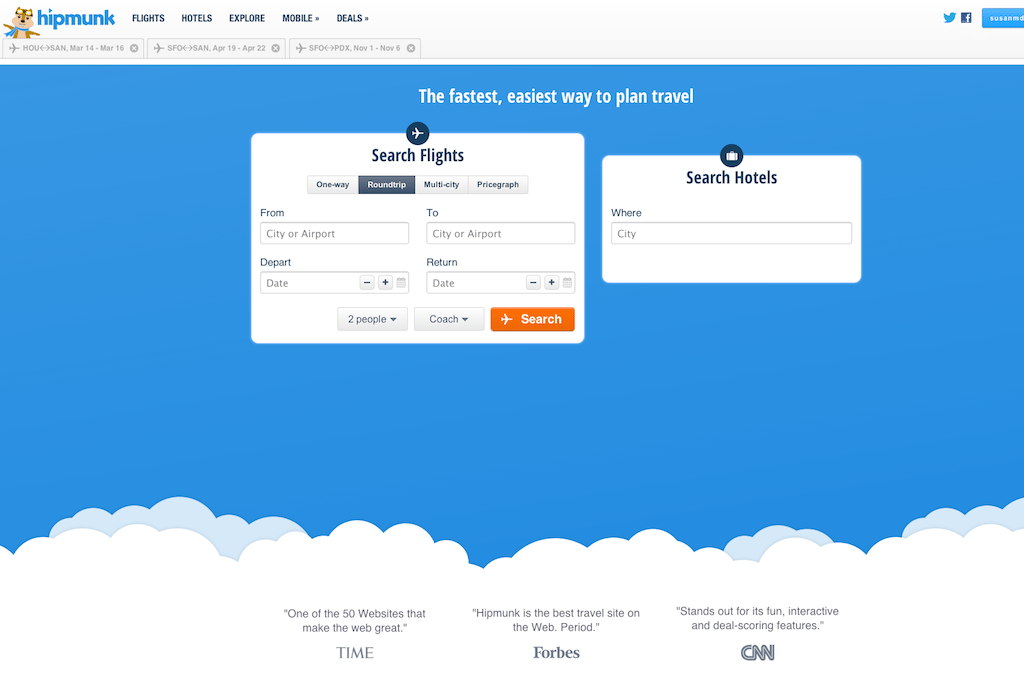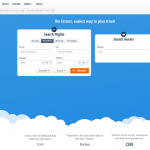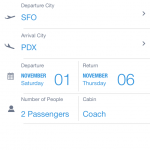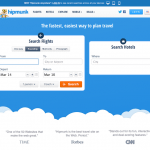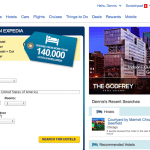Skift Take
In a few years, the streamlined, cross-platform searching that Hipmunk and Expedia are creating will be taken for granted because any company worth anything will have to offer it. So far Hipmunk Anywhere is more intuitive than Expedia's Scratchpad with fewer clicks or taps, but these are very early days.
- If you sign into Hipmunk on desktop, mobile Web, smartphone app or tablet, recent searches from any device will appear as tabs at the top of the homepage (seen above beneath the Hipmunk logo). Just click on the tab to relaunch the search.
- Regardless of which device the travelers use, when they open Hipmunk’s iOS or Android apps and they are signed in, then recent searches will open by default.
- The Hipmunk homepage prompts users to log in to take advantage of the Hipmunk Anywhere feature.
- When an Expedia customer is signed into its mobile apps or desktop, recent searches will appear on the desktop in its Scratchpad feature. It’s a one-way street for now, though, as recent searches are not yet retrieved to view again in Expedia’s mobile apps.
- Expedia’s homepage has a link at top right to its Scratchpad feature, which shows the number of recent searches available to view.
Travel companies are well aware of what’s been happening with travelers’ search and booking behavior — they search on one device, get back to looking around later for a flight or hotel multiple times on myriad devices and operating systems depending on convenience or whim, and ultimately end up booking the trip most often on a tablet or desktop.
Consumers usually have to restart their searches when switching devices, but now Hipmunk and, to a lesser extent, Expedia, are doing something about the search inefficiencies of cross-platform habits.
Flight and hotel metasearcher Hipmunk has launched Hipmunk Anywhere, which enables users who are signed into its desktop or mobile apps to find their recent searches on each device regardless if they initiated them on the desktop or mobile Web, Android or iOS apps, or tablets.
For example, if you searched for a flight or hotel on Hipmunk.com and return a few hours or days later, you’ll find the searches in tabs on the desktop. Just click on the tabs to relaunch the search with updated pricing without having to re-enter the particulars.
That may not be all that radical a step since many travel companies offer “saved searches,” but where it gets really interesting is when travelers subsequently pick up an iPad, Kindle, Samsung Galaxy or iPhone.
Regardless of which device travelers used to start searching, when they open Hipmunk’s iOS or Android apps on tablets or smartphones and they are signed in, then recent searches will open by default.
The reverse is true, as well. When travelers start their searching on mobile, they can return to them on mobile without have to manually restart the searches, and the previous searches will be sitting in Hipmunk’s tabs on the desktop, too.
Hipmunk CEO Adam Goldstein says co-founder and CTO Steve Huffman took the lead on Hipmunk Anywhere, which was “a lot of work,” but built in a couple of months. There’s all kind of layers to the feature, Goldstein says, including logic about the user’s location, and of course the previous searches won’t be visible if the dates of the prospective flight or hotel stay have already passed.
“It’s a pretty significant shift and no one else in the industry has really been paying attention to the way that people are actually using these different devices,” says Goldstein, adding that comScore found that 60% of consumers launch searches on one device and then finish them on another.
The Hipmunk homepage prompts users to log in to take advantage of the Hipmunk Anywhere feature, and a spokesperson says only around 5% of Hipmunk’s desktop users and 20% of mobile users currently log in. The company expects those numbers to rise when people realize they can take advantage of the cross-platform, search-retrieval service.
Expedia’s Efforts
If the cross-platform search integration in travel is an industry first, as Goldstein believes, others, namely Expedia, are clearly paying attention, too.
Expedia.com’s homepage has a Scratchpad feature, which stores searches from mobile and the desktop on a desktop Scratchpad for easy retrieval. As with Hipmunk, users must be signed in to use the Scratchpad, and relaunch their prior searches without having to manually enter their details again.
But, unlike Hipmunk Anywhere, Expedia’s Scratchpad doesn’t yet enable users to search on the desktop and then to retrieve them on mobile or tablet. So far it is a one-way street, although getting the retrieved search results onto mobile devices is in Expedia’s plans.
To get a closer look at Hipmunk Anywhere and Expedia Scratchpad view the gallery above.
Speaking during Expedia’s fourth quarter earnings call on February 6, CEO Dara Khosrowshahi labeled Scratchpad a “first generation” feature, but the company is happy with what’s it’s seeing.
“We’re seeing very high levels of production and engagement from the folks who interact with our Scratchpad product,” Khosrowshahi said. “So when they work with Scratchpad, they come back to the site much more often, frequency increases. And in general, with higher frequency, we get stronger buying behavior.”
“So, we think it’s a product that is great for consumers and it’s a product that has a whole lot of potential and a product that we want to work into many different parts of our site, including our mobile experience. So we’re looking forward to really developing the Scratchpad product,” Khosrowshahi said. “It’s a promising start.”
What the two companies are doing is the beginning of a search utility that ultimately, in various forms, will soon be taken for granted.
And, so far they are only scratching the surface.
The Daily Newsletter
Our daily coverage of the global travel industry. Written by editors and analysts from across Skift’s brands.
Have a confidential tip for Skift? Get in touch
Tags: expedia, hipmunk, search
Photo credit: Hipmunk tabs on the top of the desktop homepage show a signed in user's previous searches, regardless if they were initiated earlier on the desktop, from mobile phones or tablets. The searches will appear on all of Hipmunk's apps and platforms. Hipmunk
